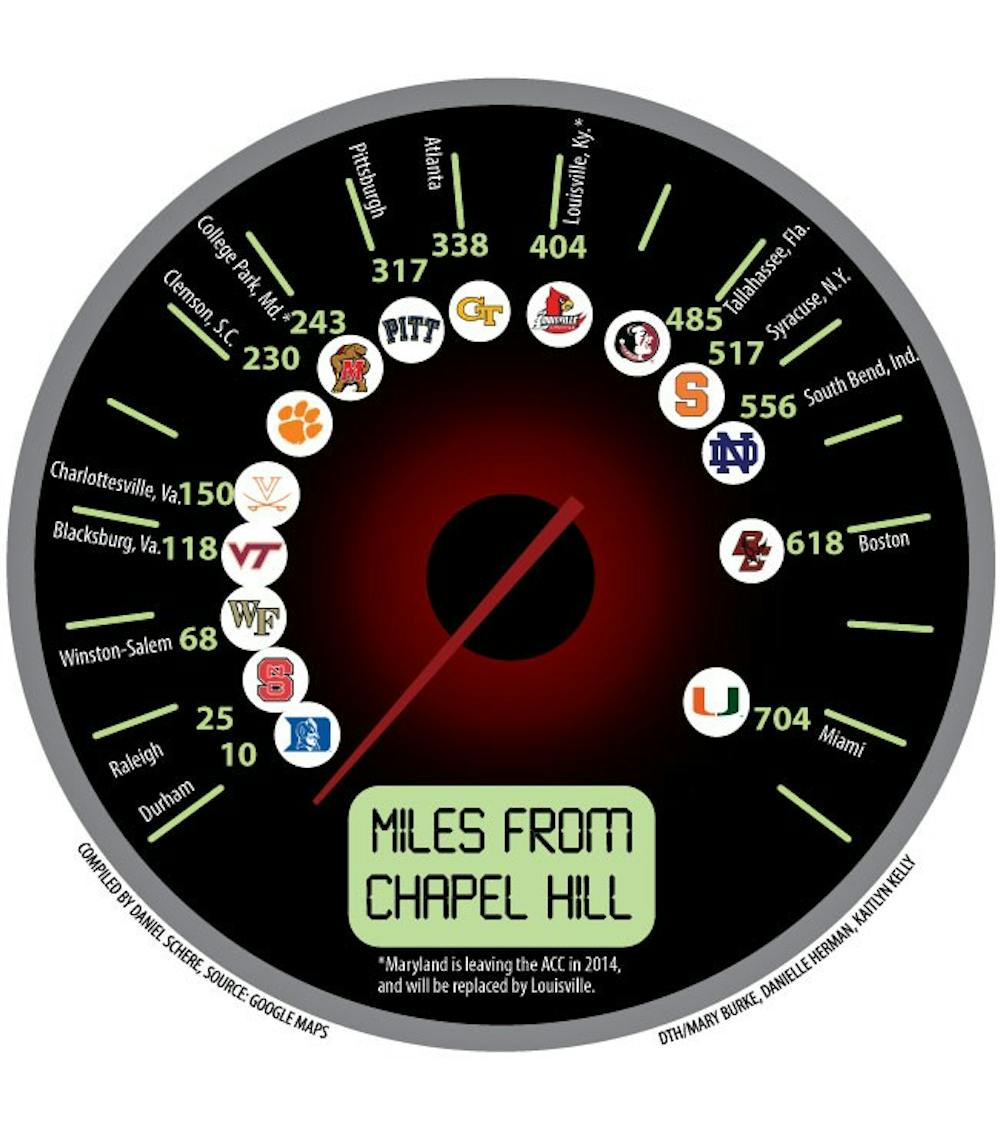“We’re not asking students to cover that gap, just an inflationary increase to cover sports programs,” he said, while noting that a similar $4.50 increase was approved last year.
Senior Associate Athletic Director Martina Ballen said the football and basketball programs generate 65 percent of the department’s revenue.
Last year’s travel expenses for Olympic sports totaled $2,044,364, which includes the cost of transportation, hotels and meals.
She said the athletic department does not have a projection of travel costs for this year, but the bill will increase due to additional air travel to reach the new conference teams.
“If it’s a weeknight game, they can’t bus back because one of our priorities is to try to get them back to go to class,” she said. “So sometimes they have to fly back and that’s an increased cost.”
Ballen said these fee increases are meant to ensure the department can continue operating as effectively as it did before, only in the face of increased costs from conference expansion.
“It’s not a new fee,” Ballen said. “We’re asking for an inflationary increase on an existing fee.”
She said a lack of money would compromise the quality of the department.
“If we don’t get that fee, there will be some hard decisions,” she said.
The subcommittee did not reach a decision at the meeting. If it approves the fee at a later date, it then must be approved by another task force as well as Chancellor Carol Folt and the UNC Board of Trustees before it goes into effect.
Many at the meeting took issue with the proposal, including Autumn McClellan, who represents the Graduate and Professional Student Federation.
“I don’t necessarily think students should be increasingly burdened through student fees to pay for all of that,” she said. “If it’s not financially sound, I don’t think increasing the fee each year is the way to manage this issue.”
To get the day's news and headlines in your inbox each morning, sign up for our email newsletters.
McClellan thinks the current fee of $279 is too high. She is concerned because many students, particularly graduate students, who pay the annual fee are not able to attend games.
“My constituency tells me that they do not utilize the services provided by the athletic fee,” she said.
“For those that do utilize some of these services, they feel the current fee amount, $279, is not proportional to the benefits they receive from the fee.”
McClellan said she does not think it is necessary to subject the student body to the needs of the athletic department.
But Ballen said she understands both sides of the debate.
“Any time you go before a group, and you make presentations, and there’s more discussions and interactions and concerns expressed, then you have a different dynamic there,” she said.
Traveling constraints
The costs also amount to additional travel time needed to get to the new ACC cities — which means less time in the classroom for athletes.
Senior Kelly McFarlane, a midfielder on the women’s soccer team, said there are pros and cons to the expansion.
“There’s a lot of team bonding and things like that, but it’s also more expensive for our program,” she said.
Last month, the team was on the road three weeks in a row, which included a three-game road trip to the University of Miami, Florida State University and Pittsburgh.
She noted that for games that are far away, the team must travel by plane the night before.
“That means you’re missing Wednesday for a flight and Friday for a flight as well,” she said.
“I don’t think teachers appreciate it when we’re gone three weeks in a row.”
Despite the time constraints, McFarlane said she thinks the trade-off is worth it.
“Notre Dame is a really competitive team and playing them really improves the strength of our conference,” she said.
Women’s soccer coach Anson Dorrance said he is not concerned about the addition of teams to the conference. He said he thinks the bigger issue is the structure of the schedule.
“We sacrifice too much academic loss by playing a Thursday-Sunday swing,” he said.
Dorrance said most soccer programs play on Friday instead of Thursday — a system he said he thinks would be more beneficial to players.
“Basically, it’s one day less of class missed,” he said.
Nationwide costs
Soaring athletic fees are nothing new and can be seen around the country, said Karen Weaver, a sports management professor at Drexel University.
“The vast majority of Division I programs lose money,” she said.
Weaver said Olympic teams often fail to generate the amount of revenue needed to fund athletic departments because the games are in the middle of the week, when students are in class.
“It’s simple economics,” Weaver said. “More people watch football than lacrosse.”
Weaver said some schools charge as much as $2,000 per year in athletic fees.
“Everything comes at a price,” she said. “You’ve got to put up with a really rampant commercial culture on campus.”
In addition, Weaver said Olympic teams face tougher academic demands — and the added travel makes a difference in athletes’ ability to study.
“Doing it on the road is not the same as doing it in your normal quiet environment,” Weaver said.
Ultimately, Weaver said she thinks schools like UNC need to have a serious discussion about the growing financial and academic constraints that sports place on universities.
“Just asking questions about travel should be a priority,” she said.
“You’re not only thinking of yourselves, you’re thinking of the next group and the next group.”
university@dailytarheel.com



